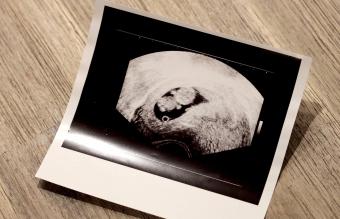
When you're 9 months pregnant, there's a lot going on - with your body, your baby's development, and your emotions. Following is a run down of what you may be going through during the last month of pregnancy.
Your Body During the Last Month of Pregnancy
Your body goes through changes throughout your entire pregnancy, but during the last month, it all becomes very noticeable. Some physical changes you may experience, or will experience, when you're 9 months pregnant include:
Shortness of breath: Early in the ninth month, your uterus is putting a lot of pressure on your lungs and diaphragm. Even just a walk around the house may leave you breathless. You can and should still be getting out and walking or doing yoga, but take it slow. Your body wants you to slow down to prepare for the birth. While sitting, be sure to sit up nice and straight. While sleeping, prop your head up on some extra pillows for support. When your baby engages or drops down, your breathing will improve, which can happen as early as six weeks before the birth.
Itching: By now, your skin is pulled about as tight as it's ever been in your life. It may be getting pretty itchy, especially if you're pregnant during hot weather. If itching is really bugging you to the point of interfering with your rest, ask your health care provider for advice. Often, a basic mix of a tablespoon of witch hazel and three drops chamomile essential oil is soothing to itchy skin.
Pressure on your pelvic region: Once your baby engages, you may feel a buzzing feeling (or vibration) in your vagina as your baby moves his head against your pelvic floor muscles. Unfortunately, the pressure will also cause you to have to urinate even more often then you already have been.
Aches and heat: Your body has been carrying this pregnancy for nine months now - that's a lot of work on your ligaments and muscles. You may feel achy after standing for just a little bit. You're also likely to feel hot most of the time. By this time, your body's circulation is maxed-out efficiency-wise, which makes you warmer than normal.
Indigestion: During the last few weeks, many women are affected by the foods they eat. Indigestion is common. To ease symptoms eat slowly, eat small meals, and avoid eating before you go to bed.
Contractions: You may start having what is known as false labor or Braxton Hicks contractions. Braxton Hicks contractions can feel like real labor contractions - a tightening to cramping, painful feeling that wraps around under your belly and back. False labor contractions may continue for about 20 seconds, release, and come back after 10 minutes. The difference between false labor contractions and real labor contractions is that Braxton Hicks contractions don't increase in speed or intensity. Real labor contractions become quicker and much more intense. False labor is frustrating, but these practice contractions help soften the cervix, which helps prepare you and your body for birth.
Your Baby's Development when You're 9 Months Pregnant
Your baby is almost fully developed by the ninth month of pregnancy. Most babies born early in the ninth month will survive and thrive, so you're out of that premature birth stage, which is nice. Some other physical developments your baby has by the ninth month include:
- He can see the difference between light and dark and may perk up if you shine a light on your belly.
- Your little one has increased his weight about 600 times over since conception. Other parts of your baby are growing fast now, like hair and nails.
- He'll engage: This means your baby will drop or settle down into a position that is birth ready.
- Your baby has little move to move around because he's gotten so big. This means you may feel fewer kicks and bounces. You should still feel your baby moving, but not as actively. You'll feel more jabs than kicks and punches.
Emotions Run High
When you're 9 months pregnant, you may be emotionally charged. There's a lot going on and, on top of that, you're likely feeling tired. You may feel prenatal depression because you're worried, scared of giving birth, or coming to the realization that this pregnancy is going to result in a new part of your life - you as a parent. It can be overwhelming. If you're feeling too overwhelmed, don't be alarmed; you're not the only woman to feel this way. Talk with your health care provider because she or he is there to help you deal with just these sorts of feelings.
Some women feel exhilarated during this time and start to rush around doing last minute tasks in preparation for their baby's arrival (sometimes called nesting). If this is you, try to relax since labor and birth take a lot out of you. That old saying "Sleep now while you can" that is often quoted to parents-to-be is completely true. Rest is important.
Lastly, you may be vulnerable to suggestion. Many women are just plain tired of being pregnant by the ninth month and inducing labor can sound like a dream come true. However, unless totally medically necessary, induced labor can cause more harm than good. Interventions like epidurals and complications such as fetal distress and c-sections are more common with induced labor. In most cases, a woman's body knows when it's ready to give birth all on its own, so patience, while frustrating, is a good thing.







